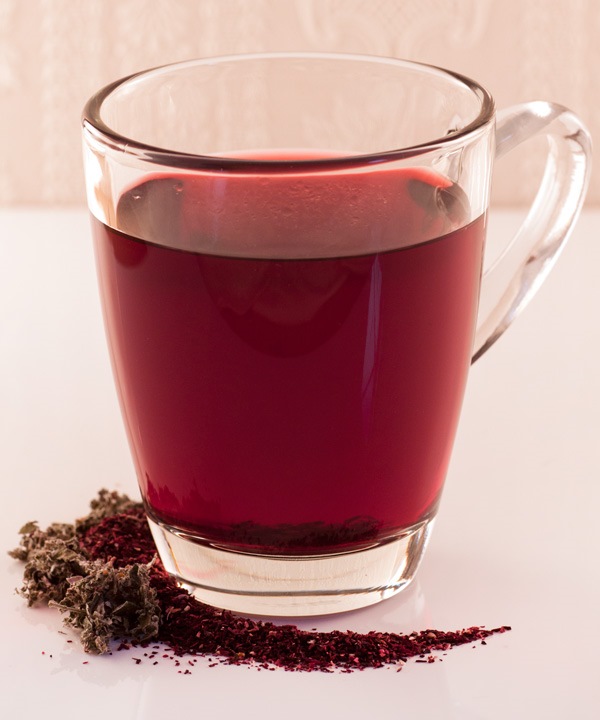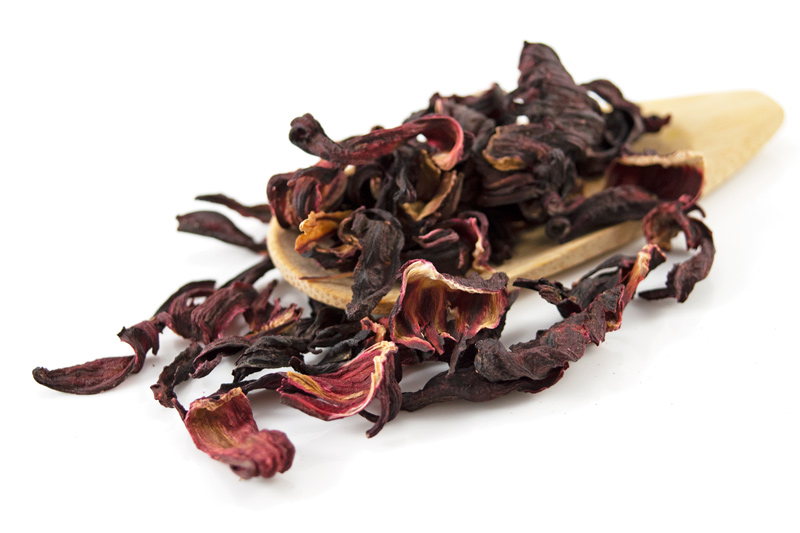Healthy Hibiscus, the Magenta Marvel
A huge amount of herbal tea blends use hibiscus as their base, and if your fruity tea bag of choice produces a drink that’s deep red in colour and has a lovely, tangy fruitiness, it’s likely the ingredients will include hibiscus. But what is hibiscus, and is it only there for its pretty colour and lip-smacking taste, or is it any good for us?
Hibiscus is actually an umbrella term describing a variety of species of flowering plants in the Malvaceae family. The most commonly used of these is Roselle (Hibiscus sabdariffa), which is native to Africa and produces the lovely, colourful infusion we know as hibiscus tea. It’s commonly consumed in many countries such as Senegal, Nigeria, Sudan and Egypt, where it’s known as karkadé. It’s drunk both hot and cold, and has a tart flavour which is quite close to that of cranberries. Because of this, it’s commonly sweetened with sugar or honey.
Let’s delve deeper into this wonderful plant and investigate its awesome health-giving properties….

Scientific research suggests that ingestion of hibiscus boosts metabolism, making many of our biological processes more efficient, including the way our bodies deal with the food we eat. In a randomised controlled trial carried out in 2014, subjects who drank hibiscus tea daily for 12 weeks were found to have reduced their abdominal fat, significantly lowered the fatty acid levels in their blood and had considerably improved the efficiency at which their liver dealt with dietary fat.[1]
Hibiscus has been shown to have brilliant effects on metabolic syndrome, an abnormal metabolic complex with symptoms including obesity. Authors of a research trial published in 2020 found that after a group of elderly women had two cups of hibiscus tea every day for 3 weeks, there was a significant decrease in body weight, blood pressure, post-meal blood sugar levels and bad cholesterol. They also discovered that hibiscus reduced levels of the stress hormone cortisol, which stimulates our bodies to store fat.[2]
Superb for lowering blood pressure
Hibiscus has been shown to be excellent at lowering high blood pressure. It appears to boost production of nitric oxide in the body; this is a vasodilator, meaning it helps arteries relax and dilate better, thereby reducing the pressure of the blood inside them.[3] In a 2019 medical trial, 46 people with high blood pressure who drank two cups of hibiscus tea a day found their blood pressure underwent a substantial drop.[4] A comprehensive review of studies on the subject led researchers to conclude that through its ability to lower blood pressure, hibiscus has great potential to reduce risk factors associated with cardiovascular disease.[5] A medical trial in 2004 found that hibiscus was equally as effective at reducing blood pressure as a leading, commonly-prescribed powerful blood pressure medication.[6]
Brilliant for cholesterol levels
In a randomised clinical trial whose results were published in 2010, hibiscus was found to significantly increase levels of HDL-C, commonly known as ‘good cholesterol’.[7] The triple whammy of polyphenols, flavonoids and anthocyanins found in hibiscus have superb beneficial effects on preventing the buildup of cholesterol in our arteries. A medical trial conducted in China in 2007, in which volunteers supplemented with hibiscus for one month, led researchers to conclude that taking it can significantly lower the serum cholesterol level and it should be explored as a treatment for patients with high cholesterol.[8] Another study done in Mexico in 2019 found that patients supplementing with hibiscus extract underwent a 23.2% decrease in blood cholesterol levels, massively reducing the possibility of clogged arteries and thereby significantly improving their heart health.[9]
Several studies have suggested that compounds found in hibiscus restore insulin sensitivity in diabetics, and therefore help reduce their blood sugar levels. One of these is ferulic acid, which boosts antioxidant levels and is also excellent for our skin, as well as increasing the effectiveness of vitamins A, C and E. A report written in 2014 identified the polyphenols in hibiscus as excellent for preventing the deterioration of kidney function in diabetic patients.[10] A study conducted in Hong Kong in 2011 found that hibiscus was superb at improving a range of biological factors, and using it was a great way to boost the body’s immunity against several conditions associated with diabetes.[11] Just remember that adding lots of sugar to your hibiscus drink may undo lots of these benefits! If you need to sweeten it, try to use a healthier, lower-GI sweetener such as stevia or xylitol instead.
A fantastic amount of antioxidants
A study conducted in 2012 found that drinking hibiscus tea led to a large increase in the level of antioxidants present in participants’ blood.[12] Antioxidants are essential substances if we want to boost our health, as they protect our cells against free radicals, rogue molecules which play a part in the onset of several chronic conditions such as heart failure and cancer. Among the antioxidants present in excellent amounts in hibiscus are anthocyanins (also found in cherries, berries and lots of dark blue and red fruit and vegetables), which are superb for your health and can improve blood pressure, brain health and fight against cancer. Ascorbic acid, another antioxidant found in hibiscus, is more commonly known as Vitamin C, and is crucial for many of our biological processes, such as tissue repair.
[1]https://pubmed.ncbi.nlm.nih.gov/24549255/
[2]https://www.ncbi.nlm.nih.gov/pmc/articles/PMC7509568/
[3]https://pubmed.ncbi.nlm.nih.gov/16973321/
[4]https://www.ncbi.nlm.nih.gov/pmc/articles/PMC6621350/
[5]https://www.ncbi.nlm.nih.gov/pmc/articles/PMC3593772/
[6]https://pubmed.ncbi.nlm.nih.gov/15330492/
[7]https://www.ncbi.nlm.nih.gov/pmc/articles/PMC3168576/
[8]https://www.researchgate.net/publication/247204754_Hibiscus_Sabdariffa_extract_reduces_serum_cholesterol_in_men_and_women
[9]https://www.scirp.org/journal/paperinformation.aspx?paperid=91817
[10]https://pubmed.ncbi.nlm.nih.gov/25226384/
[11]associated with diabetes
[12]https://pubmed.ncbi.nlm.nih.gov/22331521/







